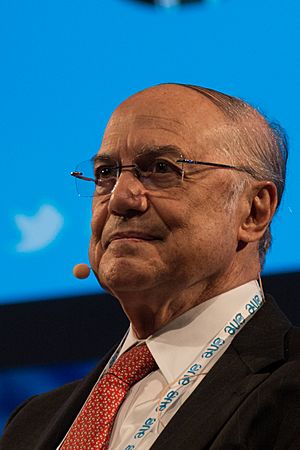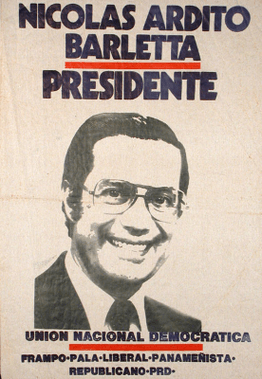Nicolás Ardito Barletta Vallarino facts for kids
Quick facts for kids
Nicolás Ardito Barletta
|
|
|---|---|

Nicolás Ardito Barletta Vallarino in 2014.
|
|
| 26th President of Panama | |
| In office 11 October 1984 – 28 September 1985 |
|
| Vice President |
|
| Preceded by | Jorge Illueca |
| Succeeded by | Eric Arturo Delvalle |
| Personal details | |
| Born |
Nicolás Ardito Barletta Vallarino
21 August 1938 Aguadulce, Panama |
| Political party | Democratic Revolutionary Party |
| Spouse | Maria Consuelo Rivera |
| Alma mater | North Carolina State University |
| Occupation | Politician, economist |
Nicolás Ardito Barletta Vallarino was born on August 21, 1938. He is a Panamanian politician and economist. He served as the 26th President of Panama from October 11, 1984, to September 28, 1985. He ran for president as a candidate for the Democratic Revolutionary Party.
Contents
Education and Early Career
Learning and Degrees
Nicolás Ardito Barletta studied at North Carolina State University. In 1959, he earned a Bachelor of Science degree in Agricultural Engineering. Later, he received a Master of Science degree in Agricultural Economics. In 1971, he earned a doctorate in economics from the University of Chicago. His special research was about the costs and benefits of farming research in Mexico.
Working for Panama
From 1968 to 1970 and again from 1973 to 1978, Barletta was an important advisor to General Omar Torrijos. He worked as the minister of planning and economic policy. He also helped Panama negotiate the economic parts of the Panama Canal Treaty. This treaty was about how the Panama Canal would be managed.
From 1978 to 1984, he worked for the World Bank. He was a vice president for Latin America and the Caribbean. In late 1983, he was asked to run for president of Panama.
Presidency (1984-1985)
The 1984 Election
In February 1984, President Ricardo de la Espriella stepped down. His vice president, Jorge Illueca, took over but did not run for a full term. Nicolás Ardito Barletta ran for president with the support of the military and the government. His main opponent was Arnulfo Arias, an 82-year-old politician who had been president three times before. Arias had been removed from office by military actions each time.
This election was very important because it was the first one after 16 years of military rule in Panama. Barletta promised to bring back democracy, improve the economy, and have an honest government. Arias wanted to reduce the military's power in politics. The election campaign was very competitive. Many people felt the election was not fair. Most TV, radio, and newspapers supported Barletta's side.
Voting day was May 6, 1984, and it was peaceful. However, the next day, there were protests. The opposition claimed there was cheating in the election. The final vote count was delayed. Eventually, Ardito Barletta was declared the winner by a very small number of votes. Many people believed that Arias should have won. The U.S. government knew about the problems but still accepted Barletta's victory.
Time in Office
Ardito Barletta became president on October 11, 1984. He was known for being serious and quiet. In his first speech, he promised to fix the economy, fight corruption, and unite Panama's political groups. He quickly started working on economic problems. He wanted to make the government more efficient and help the economy grow.
In November 1984, he announced new economic rules. These rules were needed to get a large loan. They included a new tax and reduced budgets for government offices. However, many people protested, including workers and students. Because of these protests, he removed some of the new rules ten days later.
During his time as president, a government critic named Hugo Spadafora was found dead. Spadafora had said he had proof that a powerful military leader, Manuel Noriega, was involved in serious wrongdoing. Relatives of Spadafora said witnesses saw him with Panamanian security forces just before his death. Ardito Barletta promised to investigate the crime. This led to disagreements with the military leaders. As a result, Ardito Barletta resigned on September 27, 1985, after only eleven months in office. His vice president, Eric Arturo Delvalle, became the new president.
Many people believe that Barletta's removal was the beginning of the end for Noriega's power. Within four years, Noriega was removed from office by the U.S. military.
After the Presidency
After his time as president, Nicolás Ardito Barletta continued to work for Panama. From 1995 to 2000, he was the General Administrator of the Interoceanic Region Authority (ARI). This agency was in charge of managing the former Canal Zone and helping it become part of Panama's development. Today, Ardito Barletta is a member of The Inter-American Dialogue, a group that discusses important issues in the Americas.
See also
 In Spanish: Nicolás Ardito Barletta para niños
In Spanish: Nicolás Ardito Barletta para niños
 | George Robert Carruthers |
 | Patricia Bath |
 | Jan Ernst Matzeliger |
 | Alexander Miles |


